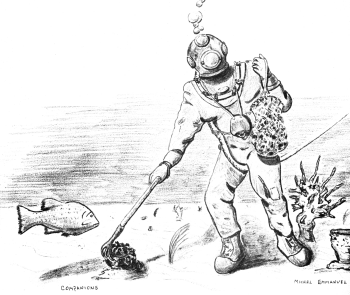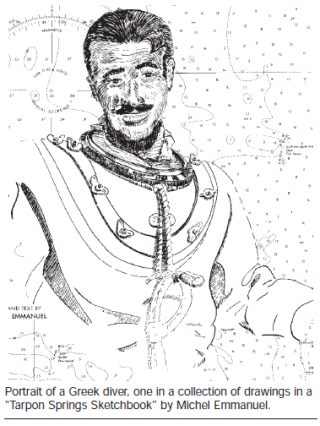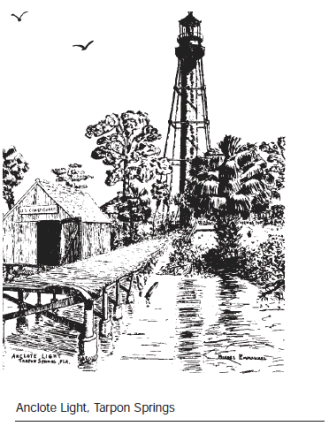By Mary Kelley Hoppe
Summer 2004

Business is booming at Tampa Bayside Marina on a sun-drenched afternoon when I pay my first visit.
Mike Emmanuel’s door is propped open to the salt air and a steady stream of co-workers and friends. A worn leather couch beckons, guests linger in the breezeway and an hour melts away in an instant under the spell of an intoxicating breeze and a sailor’s storytelling.
Emmanuel spent 22 years in the Caribbean reviving failing resorts before a call from a childhood friend brought him back to Tampa to help restart the engines on a dilapidated marina and transform it into a showplace.
He comes from a long line of Greek watermen. His great-grandfather, G. Michael Emmanuel, after whom he is named, was lured to the fertile sponge fields of Tarpon Springs from the Greek isle of Aegina. Entering through Ellis Island in the early 1900s, the patriarch brought his family, divers, helmet maker, and eighteen-year-old son, George, who would become a prominent sponge broker and president of the Tarpon Spring Sponge Exchange.
A territorial “sponge war” raged between Key West and Tarpon Springs. Key West “Conchs” harvested sponges by hook in shallower waters, while Tarpon Springs’ Greeks introduced sponge diving, plumbing deeper waters and netting four times as many sponges.
 Diving was dangerous, strenuous work. Outfitted with a copper helmet and breastplate, diving suit, iron shoes and lead weights, a diver managed a burden of nearly 400 pounds before entering the water. His lifeline to the surface was a rubber hose tendered out to depths of 180 feet. Generally, the deeper the water, the more durable and valuable the sponge.
Diving was dangerous, strenuous work. Outfitted with a copper helmet and breastplate, diving suit, iron shoes and lead weights, a diver managed a burden of nearly 400 pounds before entering the water. His lifeline to the surface was a rubber hose tendered out to depths of 180 feet. Generally, the deeper the water, the more durable and valuable the sponge.
The details come to life in the “Tarpon Springs Sketchbook,” a collection of pen and pencil drawings and writings by Emmanuel’s father, Mich. In it, he traces Tarpon Spring’s rise to prominence in the sponge industry, the arrival and influence of Greek divers, and the melding of Mediterranean and Floridian cultures linked by their bonds to the sea.
There is the other-worldly image of a sponge hooker walking the sea floor, leaning in to the current, laden with heavy boots and copper helmet. In another, grapefruit-sized sponges are strung and readied for market. There are the finely chiseled features of Greek divers, boats lashed to a sponge dock, and the sponge market at Bailey’s Bluff where kraals, built by driving stakes into the bay bottom, held dying sponges until they were washed clean by tides.
“Occasionally,” he writes, “the process was helped out by crew members who stomped the sponges in much the same manner that grapes are treaded.”
High honor is bestowed on these seafarers, whose lust for life and salt water are manifested in these pages.
Emmanuel’s father spent summers sponge diving, learning the skills of an ancient trade he would later celebrate on paper. But while pleasure diving would remain a lifelong passion, he ultimately established a law practice and family across the bay in Tampa after a spectacular military career as a seaplane aviator in World War II.
 Within the first two months of the war, he survived the Japanese sinking of two ships – the USS Langley and the tanker Pecos, one of its rescuers. Wounded and reassigned, he fought in the Atlantic before gaining acceptance into flight school. He returned to the Pacific and spent the rest of his naval career as an aviator, flying night bombing and rescue missions in a twin-engine PVY seaplane.
Within the first two months of the war, he survived the Japanese sinking of two ships – the USS Langley and the tanker Pecos, one of its rescuers. Wounded and reassigned, he fought in the Atlantic before gaining acceptance into flight school. He returned to the Pacific and spent the rest of his naval career as an aviator, flying night bombing and rescue missions in a twin-engine PVY seaplane.
Back in the states, he joined the Tampa firm that would become Carlton, Fields, Ward, Emmanuel, Smith & Cutler. Along the way, he served as president of the Tampa Chamber of Commerce and helped found University Community Hospital.
The Gold Doll, a novel he wrote about an Aegean treasure discovered in the 1880s and an artifact that subsequently disappeared under mysterious circumstances, was published in 1995 after his death.
“He was a true Renaissance man,” says Emmanuel.